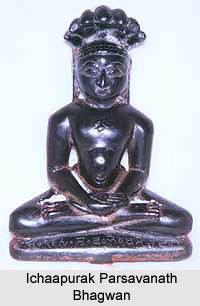 Digambar Jain Kshetra located in Beed in Maharashtra is a Jain pilgrimage centre. It is an Atishaya Kshetra i.e. Place of Miracles. It is dedicated to Shri 1008 Trylokya Chudamani Vasupujya Bhagwan and Shri 1008 Ichaapurak Parshvanatha Bhagwan. Beed is located at a distance of 125 km from Aurangabad.
Digambar Jain Kshetra located in Beed in Maharashtra is a Jain pilgrimage centre. It is an Atishaya Kshetra i.e. Place of Miracles. It is dedicated to Shri 1008 Trylokya Chudamani Vasupujya Bhagwan and Shri 1008 Ichaapurak Parshvanatha Bhagwan. Beed is located at a distance of 125 km from Aurangabad.
History of Beed Digambar Jain Kshetra
According to history the idol of Shri 1008 Trylokya Chudamani Vasupujya Bhagwan have been discovered from an underneath the basement about 250 years ago. The idol of Lord Parshvanatha is associated with many miracles and legends. According to a story, in the year 2002 during the festival of Das Lakshan Parva, the idol of Parshvanatha was mistakenly broken from the neck. The body of the idol thus fell to the ground. Acharya Krushagnandi Maharaj suggested that a pit needs to be dug and the idol must be placed inside it. He then asked to fill the pit with ghee and sugar up to top. The door was then to be locked and it must be continuously worshipped upto sixteen days and night. His instructions were minutely followed. As a result the neck was miraculously joined with the body. However, the mark on the neck is visible. It is believed by the devotees that if the Lord is worshipped with complete devotion it fulfills the desires of the followers. As the idol eliminates the worries and problems of the pilgrims and makes them free from all problems it has been named as Ichaapurak Parshvanatha.
Temple of Digambar Jain Kshetra
The temple of Digambar Jain Kshetra is dedicated to Shri 1008 Trylokya Chudamani Lord Vasupujya Swami and Shri 1008 Ichaapurak Parshvanatha. The temple has been artistically constructed with intricate designs. The idol of Lord Parshvanatha is also very attractive and has been beautifully carved. The temple organises annual gatherings. A festival is organised every year on the Bhadrapadh Shukla. During this festival special arrangements are made for pilgrims for residence and meal. The temple has provisions for dharamshalas or rest houses for the pilgrims. They are equipped with all modern facilities.
The Temple of Digambar Jain Kshetra is well connected with road, rail and air. Busses are available from Aurangabad for Beed. The nearest railway station is the Aurangabad Railway Station. The nearest airport is situated in Aurangabad.




















